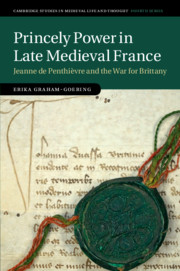Book contents
- Frontmatter
- Dedication
- Contents
- Illustrations, Maps, and Tables
- Acknowledgements
- A Note on Names
- Abbreviations
- Introduction
- 1 The Career of Jeanne de Penthièvre
- 2 Concepts of power in Jeanne de Penthièvre’s acta
- 3 Managing Property: Inheritance and Seigneurial Partnerships
- 4 Managing People: Followers and Service
- 5 Managing Order: Conflict, Negotiation, and Women as Lords
- 6 Debating the Social Context of Princely Power in 1341
- 7 Legitimate Rule and the Balance of Power
- Conclusion
- Bibliography
- Index
5 - Managing Order: Conflict, Negotiation, and Women as Lords
Published online by Cambridge University Press: 31 March 2020
- Frontmatter
- Dedication
- Contents
- Illustrations, Maps, and Tables
- Acknowledgements
- A Note on Names
- Abbreviations
- Introduction
- 1 The Career of Jeanne de Penthièvre
- 2 Concepts of power in Jeanne de Penthièvre’s acta
- 3 Managing Property: Inheritance and Seigneurial Partnerships
- 4 Managing People: Followers and Service
- 5 Managing Order: Conflict, Negotiation, and Women as Lords
- 6 Debating the Social Context of Princely Power in 1341
- 7 Legitimate Rule and the Balance of Power
- Conclusion
- Bibliography
- Index
Summary
This chapter concludes the detailed examination of co-rule with two responsibilities most intimately connected with lordship in medieval thought and modern scholarship: war and justice. During the succession dispute, the Montfortists raised the standard complaint that a woman could not undertake these duties, but the Penthièvre case argued that inheritance and shared power circumvented this objection. Jeanne’s actual engagement with responsibilities of jurisdiction and warfare demonstrates that although her role expanded in Charles’ absence, she continually acted in her own right rather than as a proxy or intercessor, two dynamics strongly linked to women’s exercise of power (and particularly to queenship). This independence allowed Jeanne to use power-sharing as an active strategy to stabilize her and Charles’ position during periods of protracted negotiations, as two case studies show. At the same time, theoretical and practical distinctions made between performing these seigneurial responsibilities in service to one’s lord, and one’s own exercise of lordship, embedded the gender dynamics of spousal co-rule within the negotiation of power across the French sociopolitical structure.
- Type
- Chapter
- Information
- Princely Power in Late Medieval FranceJeanne de Penthièvre and the War for Brittany, pp. 156 - 189Publisher: Cambridge University PressPrint publication year: 2020



